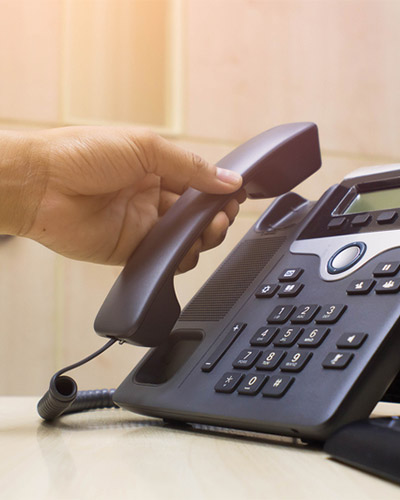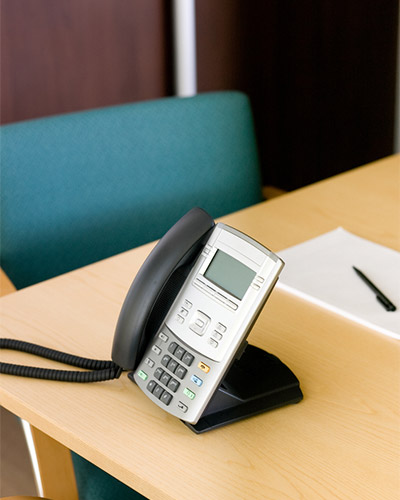
Office Phone Systems
Unlocking the Secrets to Office Phone Systems: Choosing the Right One to Meet Your Needs
Understanding the various features and requirements of modern office phone systems is easier than ever. Our definitive guide will provide you with the information you need to make an informed decision that ensures optimal service for both customers and employees. From evaluating cost-effectiveness and scalability, to considering calling features like voicemail transcription and video conferencing, we’ll help unlock the secrets of selecting an ideal office phone system for your business.
How do office phone systems work?

What are the features of an office phone system?
When selecting a phone system for your business, it’s important to understand the features available. While all systems will provide basic call functions, there are some additional features that may be beneficial depending on your needs:
- Voicemail transcription: This feature allows voicemails to be converted into text messages, so they can be easily read and responded to.
- Video conferencing: This feature allows users to have face-to-face meetings with remote employees or customers.
- Auto attendant: This feature greets callers and provides them with options for their queries.
- Call forwarding: This allows incoming calls to be directed to the appropriate department or employee.
- Caller ID: This feature allows users to quickly identify who is calling, with minimal effort.
- Call recording: This feature records calls for quality assurance and training purposes.
There are many other features available with office phone systems that can help businesses stay connected and improve customer service. These include:
- Integration with other business tools: Many modern phone systems allow users to integrate their systems with CRM software, allowing users to access customer information quickly while on the call.
- Analytics and reporting: Analytics and reporting tools provide businesses with insight into their calling activity, allowing them to identify areas for improvement and spot trends.
- Call routing: This allows calls to be routed quickly to the appropriate person or department.
- Voicemail to email: This feature allows voicemails to be sent directly to an employee’s email address.
- Call queuing: This allows callers to be placed in a queue until the next available agent is free.
- Integration with third-party apps: Many systems allow users to integrate their phone system with other popular apps and software, such as Slack or Salesforce.
These are just some of the features available with modern office phone systems, and this list is constantly evolving as technology advances. It’s important to evaluate your needs and determine which features are most important for your business before selecting a system.
What are the benefits of a business phone system?
Office phone systems can provide many advantages for businesses, including:
- Increased productivity: By making it easier for employees to communicate with each other and customers, office phone systems can increase productivity.
- Improved customer service: Customers can get the help they need faster when businesses use a quality office phone system, leading to better customer service.
- Reduced overhead costs: Investing in a good office phone system can save money in the long run by reducing overhead costs.
- Improved security: Office phone systems can also help improve security, as they provide enhanced data encryption, caller ID, and other features that make it more difficult for hackers to gain access to sensitive information.
- Enhanced scalability: Office phone systems are easy to scale up or down depending on the needs of the business. This makes it easier for businesses to add or remove features as needed.
With automated features like voicemail transcription, auto attendant, and call routing, office phone systems can help businesses stay connected and provide excellent customer service.

What are the types of office phone systems?
- PBX (Private Branch Exchange): A PBX is a dedicated system that runs on traditional landlines. It has multiple lines that allow for both internal and external call routing, as well as features like voicemail, auto attendant, and conference calling. Advantage: The main advantage of PBX systems is that they are reliable and don’t require a lot of maintenance. They also provide easy access to features like voicemail, auto attendant, and conference calling. Disadvantage: PBX systems are more expensive than VoIP systems and can be difficult to scale as your business grows.
- VoIP (Voice over Internet Protocol): VoIP systems use the internet to transmit phone calls instead of traditional landlines. They’re typically more cost-effective than PBX systems and offer features like voicemail, video conferencing, auto attendant, and unified messaging. Advantage: The main advantage of VoIP systems is that they are cost-effective and offer features like voicemail, video conferencing, auto attendant, and unified messaging. They’re also easier to scale as your business grows. Disadvantage: The downside of VoIP systems is that they rely on a strong internet connection, so if the connection is unreliable, it can affect the quality of your calls.
Here are some of the other types of office phone systems:
- Cloud PBX: A cloud PBX system is a combination of the traditional landline-based PBX and VoIP systems. It allows you to make and receive calls over the internet, while also providing features like voicemail, auto attendant, and conference calling. Advantage: Cloud PBX systems are cost-effective and easy to scale as your business grows. They also offer features like voicemail, auto attendant, video conferencing, and unified messaging. Disadvantage: The main downside of cloud PBX systems is that they rely on a strong and reliable internet connection, so if the connection is unreliable, it can affect the quality of your calls.
- Unified Communications: Unified communications systems integrate different communication channels such as voice, video, web conferencing and instant messaging into a single platform. Advantage: The main advantage of unified communications is that it simplifies communication between users by allowing them to access all communication methods from one platform. This can help to streamline processes and reduce costs. Additionally, unified communications systems are scalable, so you can easily increase capacity as your business grows. Disadvantage: The downside is that these systems can be expensive and require specialized hardware and software.
- Hybrid: A hybrid system combines elements of PBX and VoIP systems. It’s a good choice for businesses looking to use both traditional landlines and the internet for their phone service. Advantage: Hybrid systems offer the advantage of combining features from both PBX and VoIP systems. This allows businesses to make use of traditional landlines while still taking advantage of cost-saving VoIP features like voicemail, video conferencing, auto attendant, and unified messaging. Disadvantage: The main downside is that hybrid systems can be expensive to set up and maintain. Additionally, they require specialized hardware and software.

Evaluating cost-effectiveness
When shopping for an office phone system, it’s important to consider the cost-effectiveness of the system. How will the system impact your bottom line? Companies want to get the most value for their money, and they want to be sure that any investments they make will be worth it in the end.
Cost-effectiveness includes both the up-front cost of the system and the ongoing costs, such as maintenance fees and service contracts. It’s also important to consider how the system will impact your bottom line. Will it save you time and money?
In order to make an informed decision, a company needs to weigh all of these factors and come up with a cost-effective plan. The goal is always to find the best possible solution for the least amount of money. Bundling your services can help reduce costs as well, so be sure to explore all the ways that SSG Technologies can help your business succeed: https://4ssgtech.com/
Scalability is an important consideration
That’s why one of the most important factors to consider when choosing an office phone system is scalability. Can the system grow with your business? Many businesses experience rapid growth in the early years, so it’s important to select a system that can accommodate future expansion.
Businesses should also consider whether the system is modular – can individual components be added or upgraded as needed? This flexibility allows businesses to customize the system to their specific needs.

Ease of use and manageability is essential
What is the average cost of a phone system for businesses?
In general, businesses should budget for at least $100 per user when shopping for an office phone system. Additional setup costs such as installation fees and hardware purchases may also apply.

How to choose the right office phone system
- What features do I need? Consider the calling features you need most and look for a system that meets those needs. Different types of office phone systems offer different features. Make sure to consider the features you need for your business, such as voicemail, video conferencing, auto attendant, and unified messaging.
- Is the system cost-effective? Look at both the up-front and ongoing costs of the system to get an accurate picture of its cost-effectiveness. The cost of an office phone system will depend on the type of system you choose and the features you need. PBX systems tend to be more expensive than VoIP systems, while cloud PBX and UC systems can vary in cost depending on the features you require.
- Is the system scalable? As your business grows, it’s important to choose a phone system that can scale with it. VoIP and cloud PBX systems are typically easier to scale than traditional PBX systems.
- Is the system easy to use and manage? One of the most important factors to consider when selecting a new office phone system is ease of use. The system should be easy to set up and use, with a user-friendly interface. This will make it easier for your employees to adopt the new system and will help ensure that they are able to use it effectively.
- What kind of customer support does the provider offer? businesses should also consider the type of customer support they need. Some office phone systems may offer 24/7 technical assistance and customer service, while others only provide limited support during business hours. Businesses should ensure that their chosen provider offers the level of support they require.
By answering these questions, you can determine which office phone system is best suited for your business’ needs.
How often should a business phone system be upgraded?
Businesses should upgrade their phone systems periodically to keep up with changing technology and customer needs. Generally, a business should consider upgrading its system every three to five years to ensure that it is providing the most efficient and cost-effective service possible. Upgrading your office phone system can also help you take advantage of new technologies such as artificial intelligence (AI) and voice recognition that can help improve customer service. Additionally, new features such as mobile integration and cloud storage can provide your business with the tools it needs to stay competitive.
By investing in periodic upgrades, businesses can ensure that their phone systems remain up-to-date and continue to meet the needs of their customers. Upgrading your office phone system can also result in increased efficiency, improved customer service, and cost savings. Ultimately, a regularly upgraded office phone system is essential for any business looking to stay competitive in today’s market.
By researching the different options available, businesses can find the right office phone system for their needs and budget. With the right system in place, businesses can maximize their resources and ensure that they are providing the best possible customer service. When it comes to selecting an office phone system, careful consideration and research is key to finding the right solution for your business. Choosing a reliable, cost-effective system with features tailored to your needs will help you stay connected and provide the best possible service to your customers.
Can I integrate my office phone system with other systems?
Contact the experts at SSG Technologies today
Once you have chosen an office phone system, it’s essential to have it installed correctly by a professional. Poorly installed or configured systems can lead to problems with audio quality, dropped calls, and other issues. A good installer will ensure that your system is set up correctly and provide helpful advice on how to use the features of your chosen system.
Contact SSG Technologies today to discuss your office phone system needs and find the right solution for your business. We have extensive experience in setting up and configuring office phone systems, providing customer-centric solutions that deliver both value and performance. With SSG Technologies by your side, you can make sure that you get the most out of your new office phone system.

